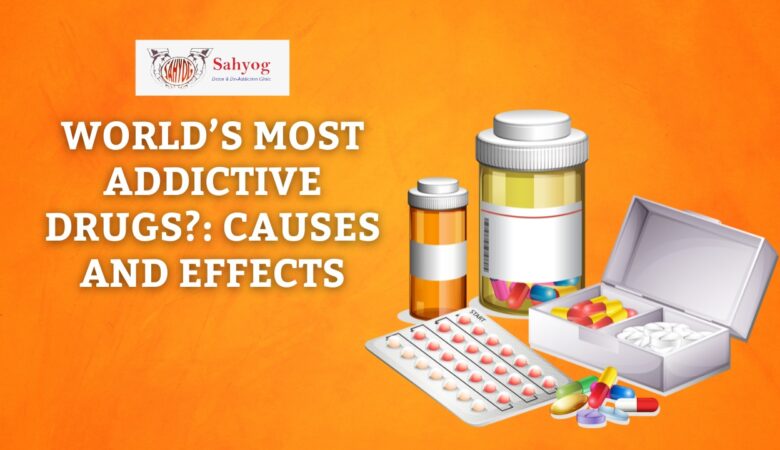World’s Most Addictive Drugs? causes and effects
It seems like just about every day there’s a new news report about some new drug that’s become popular among teens and young adults. While some of these drugs may seem harmless – such as candy bars and energy drinks – others can have serious consequences, such as addiction and overdose. So what are the most addictive drugs out there? And how do they affect the body? What are the most addictive drugs? The answer to this question is a little bit tricky, as addiction is relative. However, some of the most addictive drugs include cocaine, nicotine, and alcohol. Each of these substances has a number of effects on the body, which can make them extremely difficult to quit once you start using them. Additionally, each one of these drugs can have serious consequences if abused or overused. If you’re thinking about trying any of these drugs, it’s important to understand the risks involved and what causes addiction in the first place. What are the causes of addictive drugs Addictive drugs are often caused by a combination of genetics and environment. While addiction is not simply a result of one’s environment, the combination of genetics and the environment can play an important role in addiction. Addictive drugs can be classified into two general groups: those that are addictive due to their pharmacological properties (drugs such as cocaine and heroin), and those that are addictive due to their psychological properties (such as alcohol and nicotine). Drug addiction can have both short-term (acute) and long-term (chronic) effects. What are the short-term effects of drug addiction? Short-term effects of drug addiction include changes in mood, feelings of euphoria, increased energy, decreased appetite, and impaired thinking. Drug addiction can also lead to tolerance and withdrawal symptoms when someone stops using the drug. What are the long-term effects of drug addiction? Long-term effects of drug addiction can include physical dependence on the drug, cravings, disrupted sleep patterns, problems with focus and concentration, social withdrawal, and increased risk for developing other addictions. Addiction can also lead to criminal behavior because people addicted to drugs may steal to get money. What are the effects of addictive drugs Addictive drugs are substances that can cause people to develop a physical dependency on them. Substance addiction is a disease that occurs when someone’s body becomes physically and psychologically dependent on a drug or alcohol. Addiction affects both the individual who is addicted and their loved ones. Addiction can cause people to: Become preoccupied with using the addictive substance and losing interest in activities that were once enjoyable Struggle to stop using the addictive substance even when it is causing significant harm to their health or personal relationships Feel like they need to use the addictive substance to feel good, even when they are not having any real pleasure from it There are many different types of addictive drugs, but some of the most common include opioids (such as prescription painkillers and heroin), cocaine, and nicotine. The effects of addictive drugs depend on the type of drug and how much someone uses it. Some of the most common effects of addictive drugs include: physical dependence, which means that a person needs to use the addictive substance in order to feel normal; this can make stopping using the substance difficult psychological dependence, which means that a person develops a strong emotional attachment to the drug, which can make quitting difficult How do we treat addiction? Addiction is a complex problem that requires a multi-faceted approach. Drug addiction can be caused by a variety of factors, including genetics and environment. There are many different types of addiction, and each requires a unique approach to treatment. Here are some tips for treating addiction: Identify the cause of the addiction. If you know the root cause of the addiction, you can more easily find and address the underlying issues. Addiction often stems from unresolved issues from childhood or previous relationships. If you can identify and address these issues, your chances of success in treatment will be greater. Seek professional help. Addiction is a disease, and requires professional treatment in order to overcome it. A qualified therapist can help you understand your addiction and develop a plan to overcome it. Treat the addiction head on. If you are struggling with an addiction to drugs or alcohol, do not try to self-medicate with other substances in an attempt to fix the problem. This only makes things worse and puts yourself at risk for further injury or even death. Get help immediately! Conclusion Addictions can take many forms, but among the most common are those to drugs and alcohol. While addiction is a complex issue that requires professional help, understanding its causes and effects can help you better cope with your situation. In this article, we’ll look at some of the reasons why people become addicted to drugs and how their addictions develop over time. We’ll also explore ways to break free from drug addiction if it’s affecting your life in a negative way. I hope that by reading this article, you will be better equipped to deal with addiction in your own life or know someone who is struggling with an addiction.

